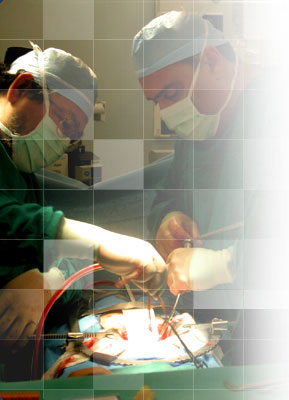If you’ve had more than one kidney stone, you are likely to form another; so prevention is very important. To prevent stones from forming, your doctor must determine their cause.
Menu

If you’ve had more than one kidney stone, you are likely to form another; so prevention is very important. To prevent stones from forming, your doctor must determine their cause. He or she will order laboratory tests, including urine and blood tests. Your doctor will also ask about your medical history, occupation, and eating habits. If a stone has been removed, or if you’ve passed a stone and saved it, the laboratory should analyze it because its composition helps in planning treatment.Read more…
Extracorporeal shockwave lithotripsy (ESWL) is the most frequently used procedure for the treatment of kidney stones. In ESWL, shock waves that are created outside the body travel through the skin and body tissues until they hit the denser stones. The stones break down into sand-like particles and are easily passed through the urinary tract in the urine.Read more…
Although some kidney stones in the ureters can be treated with ESWL, ureteroscopy may be needed for mid- and lower-ureter stones. No incision is made in this procedure. Instead, the surgeon passes a small fiberoptic instrument called a ureteroscope through the urethra and bladder into the ureter. The surgeon then …Read more…
Kidney Stones
If you’ve had more than one kidney stone, you are likely to form another; so prevention is very important. To prevent stones from forming, your doctor must determine their cause. He or she will order laboratory tests, including urine and blood tests. Your doctor will also ask about your medical history, occupation, and eating habits. If a stone has been removed, or if you’ve passed a stone and saved it, the laboratory should analyze it because its composition helps in planning treatment.
Overview
Kidney stones (renal lithiasis, nephrolithiasis) are hard deposits made of minerals and salts that form inside your kidneys.
Kidney stones have many causes and can affect any part of your urinary tract — from your kidneys to your bladder. Often, stones form when the urine becomes concentrated, allowing minerals to crystallize and stick together.
Passing kidney stones can be quite painful, but the stones usually cause no permanent damage if they’re recognized in a timely fashion. Depending on your situation, you may need nothing more than to take pain medication and drink lots of water to pass a kidney stone. In other instances — for example, if stones become lodged in the urinary tract, are associated with a urinary infection or cause complications — surgery may be needed.
Your doctor may recommend preventive treatment to reduce your risk of recurrent kidney stones if you’re at increased risk of developing them again.
Symptoms
A kidney stone may not cause symptoms until it moves around within your kidney or passes into your ureter — the tube connecting the kidney and bladder. At that point, you may experience these signs and symptoms:
- Severe pain in the side and back, below the ribs
- Pain that radiates to the lower abdomen and groin
- Pain that comes in waves and fluctuates in intensity
- Pain on urination
- Pink, red or brown urine
- Cloudy or foul-smelling urine
- Nausea and vomiting
- Persistent need to urinate
- Urinating more often than usual
- Fever and chills if an infection is present
- Urinating small amounts
Pain caused by a kidney stone may change — for instance, shifting to a different location or increasing in intensity — as the stone moves through your urinary tract.
When to see a doctor
Make an appointment with your doctor if you have any signs and symptoms that worry you.
Seek immediate medical attention if you experience:
- Pain so severe that you can’t sit still or find a comfortable position
- Pain accompanied by nausea and vomiting
- Pain accompanied by fever and chills
- Blood in your urine
- Difficulty passing urine
Causes
Kidney stones often have no definite, single cause, although several factors may increase your risk.
Kidney stones form when your urine contains more crystal-forming substances — such as calcium, oxalate and uric acid — than the fluid in your urine can dilute. At the same time, your urine may lack substances that prevent crystals from sticking together, creating an ideal environment for kidney stones to form.
Extracorporeal shockwave lithotripsy
Extracorporeal shockwave lithotripsy (ESWL) is the most frequently used procedure for the treatment of kidney stones. In ESWL, shock waves that are created outside the body travel through the skin and body tissues until they hit the denser stones. The stones break down into sand-like particles and are easily passed through the urinary tract in the urine.
Ureteroscopy
Although some kidney stones in the ureters can be treated with ESWL, ureteroscopy may be needed for mid- and lower-ureter stones. No incision is made in this procedure. Instead, the surgeon passes a small fiberoptic instrument called a ureteroscope through the urethra and bladder into the ureter. The surgeon then …
Extracorporeal shockwave lithotripsy
Extracorporeal shockwave lithotripsy (ESWL) is the most frequently used procedure for the treatment of kidney stones. In ESWL, shock waves that are created outside the body travel through the skin and body tissues until they hit the denser stones. The stones break down into sand-like particles and are easily passed through the urinary tract in the urine.
Endourolgy Ureteroscopy
Although some kidney stones in the ureters can be treated with ESWL, ureteroscopy may be needed for mid- and lower-ureter stones. No incision is made in this procedure. Instead, the surgeon passes a small fiberoptic instrument called a ureteroscope through the urethra and bladder into the ureter.
NEED ASSISTANCE?
Contact Us
- (305) 548-4005
- info@urologycure.com
- 7600 SW 57th Ave STE 213, South Miami, FL, United States, 33143
Reach us now!
Sign up to get the latest news and deals on Urology treatments!
get social:
Urology Cure ©2019 All rights Reserved.




